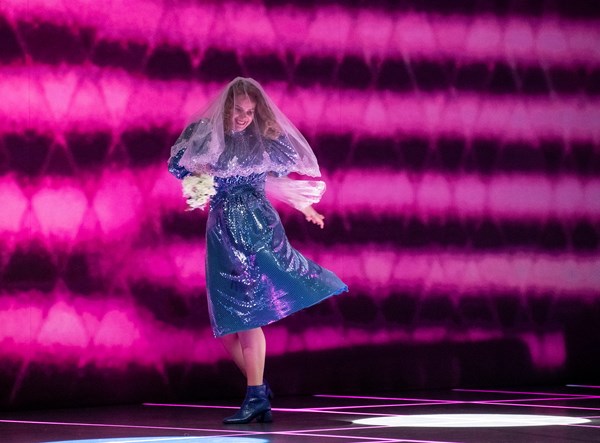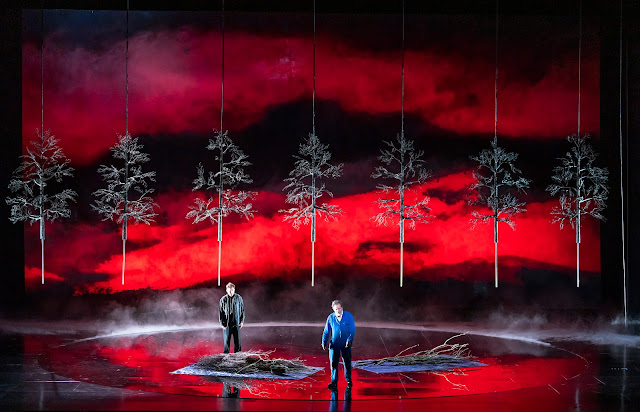Thirty years ago, in Sheffield, a teenage
schoolboy saw his first opera in the theatre. It was Wozzeck, directed
by Deborah Warner for Opera North. Quite an opera with which to begin, you
might say, and indeed in many ways it was, yet why would you wish to begin with
something that was not ‘quite an opera’? He knew a little more, though not
much, opera not having been part of his childhood or more general homelife, nor
indeed of his schooling. Plus ça change… By that time, he had just begun
to explore the operas of Mozart, those you might expect: Figaro, Don
Giovanni, and The Magic Flute. He had also, slightly clueless,
speculatively bought a reduced, ‘historic’ recording of Tristan und Isolde
from WH Smith and had watched a video, kindly lent by his music teacher, of Die
Meistersinger. That, however, was it. He had not yet knowingly listened to
music of the Second Viennese School, though that also was suddenly about to
change. It is no exaggeration to say that those hundred minutes in the Lyceum
Theatre changed his life.
From 1993 to 2023: an avid (if, born
perhaps of that initial experience, selective) opera-goer travelled across another
English city for the first night of a new production of Wozzeck, also
directed by Deborah Warner, now for the Royal Opera. Full circle? Not really;
nothing ever is. Our protagonist has, for better or worse, had numerous
experiences, music, dramatic, emotional, and intellectual, since; he is
certainly no longer a boy. Yet Wozzeck, which for him ever since has had
at least as strong a claim as any to be the single greatest opera of the
twentieth century, exerts, if anything, a still greater fascination and
admiration, certainly a greater love, than it did then, born of three decades
of living with it. How, then, would Warner II fare in circumstances both old
and new?

Truth be told, if you spend your time in Wozzeck
thinking about a previous production or performance, something has gone wrong
(either with you, what is onstage, or both). I did not. In any case,
comparisons either with Warner’s first staging or with when I had previously
heard Antonio Pappano conduct the work (twenty-one years ago for Keith
Warner’s then-new production, in Pappano’s first season at Covent Garden)
would largely be meaningless, given the vagaries of memory and my lack of a
written record. Deborah Warner in 2023 does not seem to me especially to
take a view or standpoint, at least not exclusively. This is not a Wozzeck
that (over-)emphasises the brutality of military life and war, or expressionist
experimentalism, or any one thing, though many such things are present. The
action is already taking place as we take our seats, soldiers (an excellent
troupe/troop of actors) relieving themselves in various ways, cleaning up,
doing very much what soldiers do in barracks. That establishes an expectation
of realism which is not entirely fulfilled, but rather is supplemented, so that
as the action develops, as different standpoints are afforded by the work (and probably
its creator), we have opportunity to take them too. Everything takes place more
or less where one might expect, but there are always refreshing touches of set
design, costume, lighting, or detailed Personenregie – let alone the
musical performances – to enable us to take a fresh look and listen. The drama
unfolds, with great immediacy, yet always it feels that this is ultimately Wozzeck
rather than ‘Deborah Warner’s Wozzeck’, whether that feeling, even that
possibility, be a fond illusion or otherwise. Different settings for different
scenes – no fewer than fifteen of them – present themselves without fussiness
or fetishisation: this is a light, enabling, generous realism that can shade almost
imperceptibly into other, complementary aesthetics as required. Credit is
surely due both to the design team and to the Royal Opera House’s technicians
and actors, who accomplished this feat with such apparent ease. Rehearsal
surely paid off.

Slightly stylised trees, Cross-like, hint
at Wozzeck’s fate, albeit without redemption, but also at a natural world
beyond that neither knows nor cares, yet in some sense frames tragedies that
lie in stark contrast, being entirely the creation of man. There remains a
Romantic desire to escape this miserable world, even if only to Berg’s family
estate (Berghof) in Carinthia. Like so much else, though, it is not possible.
The blood-red moon and the black, unfathomable lake dominate our vision and
consciousness as natural and human boundaries. And finally, in that
ultimate, heartbreaking scene of horror: the child turns to the wall in front
of which the other children have just been playing, to see painted on it the news
they have so cruelly, carelessly delivered. His mother is dead. He turns around
and walks off, alone. The drama stops, silence cruelly denied by some idiot’s
premature applause—but even that could not quite break the punch to the solar
plexus.
Much of that is, of course, a musical punch.
Pappano really seems to be at his best right now. Shortly after thinking his Turandot
perhaps the best I had heard from him, I found this Wozzeck at least
close to equal, and in ways that surprised me. Without wishing to play that game
of illusory comparisons, however tempting, I found this an infinitely more engaging
experience than in 2002. Often quite extraordinary orchestral precision, for
which one must of course above all credit the orchestra itself, laid bare the
framework of closed forms in themselves, their multifarious musical procedures
objects of an almost yet not quite Neue Sachlichkeit fascination, but
also showed them to be the engines of a dramatic progression that, however
Wagnerian it may often sound, is at least as much an alternative to Wagner’s
method. There were wrenching, late-Romantic passages, of course, precisely
where one would need and expect them, but this was also a musical drama that
prefigured Hindemith, Weill, perhaps even Berg’s own teacher, Schoenberg. This was not always a Wozzeck that
rose from the bass line, though sometimes it did, but it hinted more than usual
at Berg’s later writing, whilst also suggesting an earlier, almost
Mendelssohnian Romanticism. Like Warner’s production, it afforded different
standpoints, without sounding merely sectional.
I have been fortunate to see some extremely
fine Wozzecks in those years since my first encounter (Andrew Shore on that
first encounter included). Christian Gerhaher’s thoughtful, collegial approach,
placing himself and his character at the dramatic hub, gaining meaning as much
from interaction with colleagues as from his considered yet apparently spontaneous
way with the text, has nothing to fear from any of them. His performance, worlds
away, as is proper, from the beauties of his celebrated Wolfram, was yet
equally well judged. Indeed, I wonder whether it heralds a new chapter in his
career. For now, though, it will more than do in and of itself.
 |
| Wozzeck, Marie (Anja Kampe) |
There was splendid chemistry with his
Marie, Anja Kampe. I was about to say ‘we tend…’, but should really only speak
for myself: I tend often somewhat to overlook the tragedy of Marie’s
death, so overwhelmed am I by that of Wozzeck. Here I felt greater parity,
doubtless a matter of Warner’s Personenregie but also of Kampe’s
portrayal. (It is more or less impossible for an outsider to distinguish
between the two.) This important corrective was brought into further relief by
Anna Picard’s excellent programme note on ‘Maria and her World’, whose closing
words seem very much to refer to what we saw and heard: ‘She is no Kundry.
Neither is she a Judith or the hysterical Woman in Marie Pappenheim and Arnold
Schoenberg’s monodrama, Erwartung. Her murder is not dressed up as a
form of release for Wozzeck or a point of debate. It is simply a domestic
tragedy of a very ordinary, and ever modern, kind.’ Which also brings us back
to Gerhaher’s Wozzeck, for his very haplessness – what art lay in that – also contributed
to that very non-release, felt (at least by me) more emphatically than I can
recall.
 |
| Captain (Peter Hoare), Wozzeck |
All in the cast contributed to the greater
dramatic (and musical) whole, so much as to suggest unusually fruitful close collaboration
between all concerned. Sam Furness’s Andres surprised me, not least because I
often find myself wondering where the role went, thinking it smaller than I had
expected. Not here: this was a character sympathetic to Wozzeck who yet had his
own story to tell. Likewise Rosie Aldridge’s spirited Margret, whose spot in
the second tavern scene almost had time stand still as the world disintegrated
around her. Peter Hoare’s Captain and Brindley Sherratt’s Doctor made a sharply
etched pair: guilty, yet not guilty, like all in the world we saw. Well,
perhaps not quite all, for it is difficult to find any grounds to absolve the Drum
Major, here given an appropriately nasty, bullying, yet finely sung performance
by Clay Hilley. William Spaulding's Royal Opera Chorus was on outstanding form too.
What, then, should a Wozzeck accomplish?
There can be no definitive answer, no more than for any artwork in performance.
Different productions, different performances, different audiences will all
render such categorical statements in vain. If I have learned one thing over
the past thirty years, it will be that. That said, if one does not emerge from
a performance convinced that it is one of the greatest of all operas – ranking beyond
that is a mere parlour game – it will have been in vain. My first experience
was not; nor, emphatically was this: a searing and strangely refreshing Wozzeck,
which I hope and intend to revisit soon.











